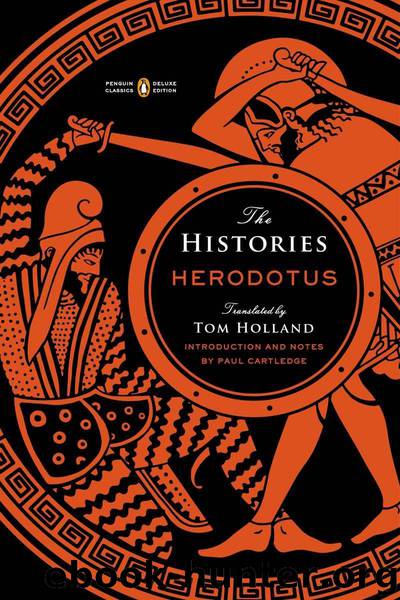The Histories (Penguin Classics Deluxe Edition) by Herodotus

Author:Herodotus
Language: eng
Format: azw3
Publisher: Penguin Publishing Group
Published: 2014-05-14T16:00:00+00:00
BOOK SEVEN
[1] When news of the battle fought at Marathon reached King Darius, the son of Hystaspes, his exasperation with the Athenians – already considerable because of their attack on Sardis – was raised to a terrible pitch, and left him even more determined to launch an expedition against Greece. Accordingly, he wasted no time in sending messengers to city after city, with instructions to raise troops: requisitions that in every case were more onerous than they had been the last time, and required the supply not only of ships, but of horses, food and transport vessels as well. These demands, which meant the enrolment and readying of the elite of Asia for the campaign against Greece, served to put the continent in a state of upheaval for three whole years. Then, in the fourth year,1 the Egyptians, who had been reduced to slavery by Cambyses,2 rebelled against the Persians. This, however, only made Darius all the more set on attacking both Egypt and Athens.
[2] Now, because it is the Persian custom that a king appoint his successor before setting out on campaign, his preparations for attacking these two targets provoked much strife among his sons as to which of them had the best claim to supreme power. Before becoming king, you see, Darius had had three sons by his first wife, a daughter of Gobryas; and then, after coming to the throne, had had four more, by Atossa, the daughter of Cyrus. The eldest of the first group of sons was Artobazanes, and that of the second Xerxes. Because they had different mothers the rivalry between these two brothers was very bitter: Artobazanes based his claim on the fact that he was the eldest of all Darius’ children, and that it was the universal human custom for the eldest son to succeed to a kingdom; Xerxes retorted that his mother, Atossa, was the daughter of Cyrus, who had won the Persians their freedom.
[3] It so happened that the wait for Darius to deliver his judgement on this matter coincided with the journey up to Susa of Demaratus, the son of Ariston, who had been deposed from the Spartan throne, and who after fleeing Lacedaemon had gone into self-imposed exile. This man, when he learned of the dissent between the sons of Darius, is reported to have gone to Xerxes and advised him to point out, in addition to all the other arguments he had been making, that by the time of his own birth Darius had already become King, and Lord of the Persians, whereas Artobazanes had been born while Darius was still in a private position. ‘That being so,’ Demaratus said, ‘it would be neither fitting nor fair for anyone to claim precedence over you. In Sparta, certainly, it is the custom, whenever there is a king whose sons were born to him both before and after his accession to the throne, for the younger son to succeed to the kingdom.’3 So Xerxes did as Demaratus had suggested; and Darius, recognizing the justice of his case, duly designated him crown prince.
Download
This site does not store any files on its server. We only index and link to content provided by other sites. Please contact the content providers to delete copyright contents if any and email us, we'll remove relevant links or contents immediately.
| Books & Reading | Comparative Literature |
| Criticism & Theory | Genres & Styles |
| Movements & Periods | Reference |
| Regional & Cultural | Women Authors |
4 3 2 1: A Novel by Paul Auster(12393)
The handmaid's tale by Margaret Atwood(7764)
Giovanni's Room by James Baldwin(7346)
Asking the Right Questions: A Guide to Critical Thinking by M. Neil Browne & Stuart M. Keeley(5775)
Big Magic: Creative Living Beyond Fear by Elizabeth Gilbert(5773)
Ego Is the Enemy by Ryan Holiday(5450)
The Body: A Guide for Occupants by Bill Bryson(5097)
On Writing A Memoir of the Craft by Stephen King(4944)
Ken Follett - World without end by Ken Follett(4733)
Adulting by Kelly Williams Brown(4574)
Bluets by Maggie Nelson(4556)
Eat That Frog! by Brian Tracy(4540)
Guilty Pleasures by Laurell K Hamilton(4449)
The Poetry of Pablo Neruda by Pablo Neruda(4109)
Alive: The Story of the Andes Survivors by Piers Paul Read(4033)
White Noise - A Novel by Don DeLillo(4010)
Fingerprints of the Gods by Graham Hancock(4004)
The Book of Joy by Dalai Lama(3986)
The Bookshop by Penelope Fitzgerald(3854)
